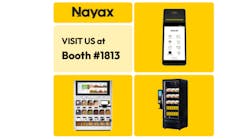Over the past several months I have talked about inventory controls, pricing, merchandising, how to set up your vehicles, and how and when to service accounts. This time I want to spend some time talking about the office paperwork, particularly the employee’s personnel files. These need to be organized and maintained no differently than vehicles and routes.
As small operators, when we first started out, we really didn’t worry too much about employment applications. We hired family and friends of family to get us started. They weren’t asked to fill out any forms because we knew who they were and we needed bodies, not seemingly unnecessary forms.
‘Oh, but the times they are a changing’ as has been sung so many times. If you have even one person working for you, you need to put together a folder for that employee so that you will be prepared in the event a wrongful termination lawsuit is brought against you.
Start with the basics
Have every person working for you, including family members and yourself, fill out an employment application, these are easy to print from any online source. All should have filled out State and Federal payroll deduction forms, and these should be updated anytime there is a change in that employee’s payroll deductions. Everyone must also fill out the Immigration and Naturalization Service (INS) form, where an employer must check to see if that person is in this country legally, and make copies of the individual’s photo IDs, again this includes all family members. Next make up a form that will show each person’s emergency contacts such as who to call, their phone numbers and relationship to employee. This should be placed in the employee’s folder along with all the others forms an operator now has.
Require a clean record
Another very important item that you need from any employee who will be driving a company vehicle is their current driving record. If your insurance company hasn’t asked for these yet, they will as you grow. No insurance company will insure anyone with a bad driving record and operators should make employees aware that if they can’t be insured then they can’t work. Also make them understand that their record is not just what they have done in your vehicles but what they have done in their personal vehicles as well. Going forward anytime someone applies for a job, they should fill out the employment application and attach a copy of their driving record from the Department of Motor Vehicles (DMV) so that you can weigh the risks involved with that person before making a decision. And by the way everyone’s driving record should be updated yearly.
Create a policy manual
Now let’s talk about employment policies, or rules of employment, the do’s and don’ts while working for you, or simply put, a Policy Manual. This doesn’t have to be a book. It can be just a page or two an operator hands out to a new employee. It must list basic things like insurance, if offered, sick/vacation days earned after a specific time employed and whether they are paid or unpaid, bereavement leave, dress code, what time to report for work, etc.
After showing what the company will provide, put down all the things expected of them to remain employed. For instance include that they can expect immediate dismissal if caught stealing, if found drinking on the job or reporting to work while intoxicated either from alcohol or drugs. Other things like being rude to customers or using any profanity towards other employees or customers will not be tolerated and it is expected they keep their machines and vehicle clean at all times.
Operators who have inventory controls might require each driver to be accountable for their collections, then they must be able to check out each week, (cash expected versus cash collected). This goes in the policy manual. In my experience, operators won’t get the total dollar amount, because that is impossible to attain, however they should have a number that they can live with as close to 100 percent as possible, just don’t tell them the number. Drivers should be striving for 100 percent and owners can deal with what actually comes in on a per route basis. One last item in the policy papers, depending on what part of the country the company operates in, operators should include an inclement weather policy in the event of snow storms, hurricanes, etc.
Once the employee has filled out the forms, been given the policy manual, there is still one more very important piece of paper that must be taken care of. Make up a form with the date and name of employee on it followed by a short sentence that says, I have read and understand all the policies that are required of me while employed. Have them sign the paper while in your presence, you sign it also, make a copy for them and put the original in their file. Later on, when least expected, that piece of paper could become priceless.
Dismissal forms and unemployment
There are a number of other forms, covering various things that can happen during the course of running a business, but if I could recommend just one it would be the employee warning form. This would be used when management warns an employee about something that they are doing against policy, but not a cause for immediate dismissal. Again the manager must date the form, write down what the infraction was and whatever resolution was agreed to by the manager and the employee. Both sign the form and put it in the employee’s file for future reference. If the same infraction continues, the operator will have a paper trail for dismissal and for using in an unemployment hearing.
Speaking of unemployment, remember that you pay for their unemployment benefits, not the government, so fight every time you feel an employee was dismissed legitimately. We fought every one of ours and in 43 years, I can count on one hand the number of times we lost. I’ll share something with you. Even though we caught employees stealing, we never used that as the reason for dismissal. Our wording went a bit like this; “the employee was unable to check out for whatever reason and being able to check out is a condition of their employment as per the company policy.”
If theft is used as the reason, be prepared to answer a lot of questions from the unemployment officer, like who else has keys to the machines and who checks the cashier. When the operator has to answer that the supervisor, mechanic, owners etc. also have keys, the case is pretty much lost.
In the end, keep good records, update as needed, be as organized in the office as in the field, stay focused and don’t react to anything without some thought process. If a decision can wait a day then sleep on it to be sure it’s the right one. Remember to use any and all resources available to help you understand the law and the policies you will be making and enforcing. It’s the safest way to avoid employment headaches in this world of increased litigation. Don’t forget NAMA as they were a great help to us when we first put our policy manual together.

Dominic Finelli
Dominic Finelli is 43-year veteran vending operator in the Washington D.C market. Along with his partner/brother-in-law, John Sartori, he helped grow a family start-up, Custom Vending, to 30 routes. Finelli earned a degree in accounting from Benjamin Franklin University, was a 3-time recipient of the NAMA Chairman's Legislative Award and the 2004 Operator of the Year. Finelli served 23 years as a director of the MD/DC Vending Association, and 10 years as the president. He sold his vending company in 2011. Finelli can be reached at [email protected].




